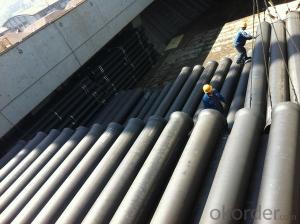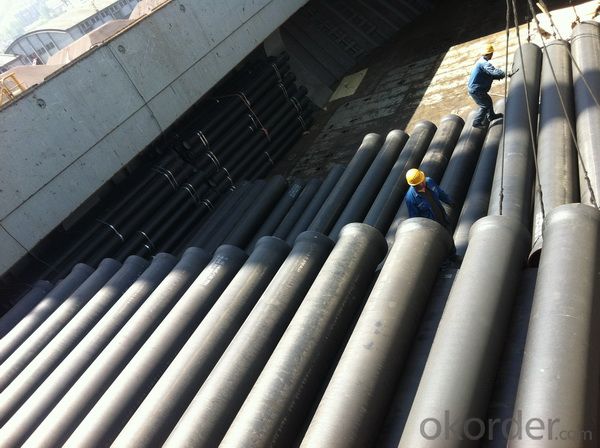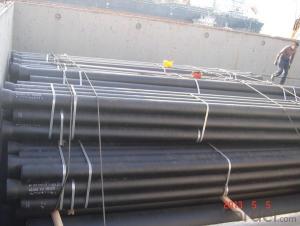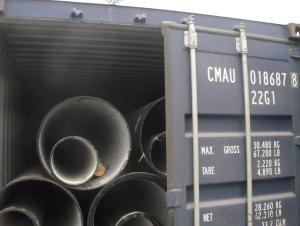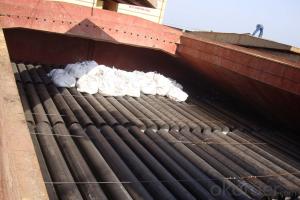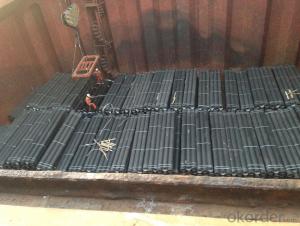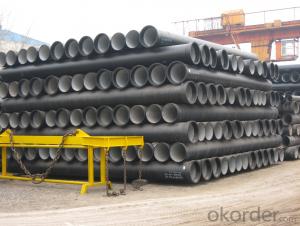K Type Ductile Iron Pipe DN200 SOCKET SPIGOT PIPE
- Loading Port:
- Tianjin
- Payment Terms:
- TT OR LC
- Min Order Qty:
- 200 m
- Supply Capability:
- 80000 m/month
OKorder Service Pledge
OKorder Financial Service
You Might Also Like
1) The standard of pipe: ISO2531:1998, EN545:2006,K9 K8
2) Effective length: 6m/5.7m
3) Inner cement line: Portland cement lineas per ISO4179
4) Zinc coating: at least 130g/m2 as per ISO8179
5) Bitumen painting: at least 70μm as per ISO8179
6)With 102% quantity of NBR, SBR, or EPDM ring asper ISO4633
7) DN80-DN1200
8) Highstrength, lighter than grey iron, good corrosion resistance, no furring, smallflow resistance, easy fixing, long life tome about 100 yeas
9)Checked by automatic inspection equipment
10) Composition:
Chemical composition | |||
Chemical composition | Ductile Cast Iron Pipe (%) | Grey iron pipe (%) | Steel pipe (%) |
C | 3.5-4.0 | 3.2-3.8 | 0.1-0.2 |
Si | 1.9-2.6 | 1.4-2.2 | 0.15-0.4 |
Mn | 0.15-0.45 | 0.4-0.6 | 0.3-0.6 |
P | ≤0.06 | ≤0.3 | 0.02-0.03 |
S | ≤0.02 | ≤0.1 | 0.02-0.03 |
Mg | 0.03-0.06 |
|
|
11) Feature:
Mechanical properties | |||
| Ductile Cast Iron Pipe | Grey Iron Pipe | Steel Pipe |
Tensile Strength(Mpa) | ≥420 | 150-260 | ≥400 |
Yield Strength(Mpa) | ≥300 | No Confirmation | No Confirmation |
Bending Strength(Mpa) | ≥590 | 200-360 | ≥400 |
Elongation (%) | ≥10 | Neglected | ≥18 |
Brinell Hardness(HBS) | ≤230 | ≤230 | About 140 |
12) T type mechanical joint
13) Packing: in bulk or container
PACKING: 1) Pipesare bundled together with the steel belt.
2) Wooden pieces are put between the pipes.
- Q: What is the average cost of ductile iron pipes?
- The average cost of ductile iron pipes can vary depending on various factors such as diameter, length, and location. On average, ductile iron pipes can range from $30 to $100 per linear foot. For example, a 6-inch diameter ductile iron pipe with a length of 20 feet may cost around $600 to $2,000. It's important to note that these prices are estimates and can change based on market conditions, project specifications, and supplier pricing. Therefore, it is recommended to consult with local suppliers or contractors to obtain accurate pricing information for specific projects.
- Q: What is the expected leakage rate for ductile iron pipes?
- The expected leakage rate for ductile iron pipes can differ depending on various factors like the pipes' age, condition, and installation approaches, as well as the quality of materials employed. Nevertheless, ductile iron pipes generally have a reputation for being durable and having low leakage rates compared to other pipe materials. Based on industry standards and research studies, well-maintained ductile iron pipes are expected to have a leakage rate as low as 0.1% per year. This implies that, on average, less than 1 liter of water may leak per meter of pipe length annually. However, it is important to note that this is an average value and actual leakage rates can vary. Regular maintenance and inspections are crucial in minimizing leaks and ensuring the longevity of ductile iron pipes. Additionally, proper installation techniques, such as using effective jointing methods and appropriate bedding and backfill materials, can also contribute to reducing leakage rates. To determine the expected leakage rate for specific ductile iron pipe installations, it is recommended to consult industry professionals and adhere to applicable standards and regulations.
- Q: What are the different joint restraint systems available for ductile iron pipe?
- Some of the different joint restraint systems available for ductile iron pipe include mechanical joint restraints, push-on joint restraints, and restrained joint systems.
- Q: What are the different types of fittings available for ductile iron pipe?
- There are several types of fittings available for ductile iron pipe, including elbow fittings, tee fittings, cross fittings, reducer fittings, flanged fittings, and mechanical joint fittings. These fittings are designed to connect and redirect the flow of the pipe, ensuring a secure and efficient system.
- Q: Can ductile iron pipe be used in areas with high groundwater levels?
- Yes, ductile iron pipe can be used in areas with high groundwater levels. Ductile iron is known for its durability and corrosion resistance, making it suitable for underground applications including areas with high groundwater levels.
- Q: General cast iron prices now
- Hello friends, Tianjin is in Shandong Qingdao 6500 7300 yuan / ton to 7100 yuan a ton of Zhejiang 7500 to 9000 yuan a ton, this is a great relationship, and the production of raw materials, for reference only, we are ductile casting manufacturers, the information can not say 100% accurate but can reference.
- Q: What is the relationship between the direction of the spigot and the direction of the flow in the ductile iron pipe?
- Use more than 18 casting molten iron, by adding the spheroidizing agent, through the centrifugal ductile iron machine high-speed centrifugal casting pipe
- Q: Are ductile iron pipes suitable for gravity flow applications?
- Yes, ductile iron pipes are suitable for gravity flow applications. Ductile iron is a strong and durable material that can withstand the weight of the water and solid waste flowing through the pipes without any issues. It has high tensile strength and can resist damage from external forces such as soil movement or heavy traffic loads. Additionally, ductile iron pipes have smooth inner surfaces that promote efficient flow and minimize friction losses. They are also resistant to corrosion and can last for decades without requiring frequent maintenance or replacement. Overall, ductile iron pipes are a reliable choice for gravity flow applications due to their strength, durability, and resistance to various environmental factors.
- Q: Can the sealing ring of ductile iron pipe be reused?
- The sealing ring is hard to install and take off. I have been in this line for six years. I haven't seen it removed. The rubber ring itself is not expensive. It is not necessary to reuse it.
- Q: Can ductile iron pipes be used for underground fire protection systems?
- Yes, ductile iron pipes can be used for underground fire protection systems. Ductile iron pipes have excellent strength and durability, making them suitable for withstanding the high pressure and temperature conditions that may occur during a fire. Additionally, ductile iron pipes have a high resistance to corrosion, which is important for long-term use underground. They also provide excellent flow characteristics, ensuring that water can be quickly and efficiently delivered to extinguish fires. Overall, ductile iron pipes are a reliable and effective choice for underground fire protection systems.
Send your message to us
K Type Ductile Iron Pipe DN200 SOCKET SPIGOT PIPE
- Loading Port:
- Tianjin
- Payment Terms:
- TT OR LC
- Min Order Qty:
- 200 m
- Supply Capability:
- 80000 m/month
OKorder Service Pledge
OKorder Financial Service
Similar products
Hot products
Hot Searches
Related keywords
